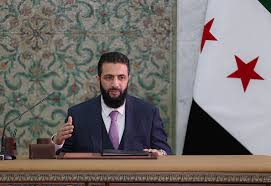Two controversial decrees recently issued by Syria’s transitional president, Ahmad al-Sharaa, have sparked a wave of legal and economic criticism, with prominent Syrian experts accusing the presidency of exceeding its constitutional mandate and undermining the principles of the transitional phase.
One of the decrees establishes a so-called “Sovereign Fund,” a state-owned financial institution with legal personality and administrative and financial independence, reporting directly to the presidency. The second decree amends Syria’s investment law—an act critics say lies beyond the powers granted to the president under the country’s transitional constitutional declaration.
Economist Karam Shaar took to Facebook to voice his concerns, warning that the decree gives the presidency sweeping authority to dispose of and invest public assets without consulting relevant ministries or the legislative authority. “One might understand the rationale under the complexities of a transitional period,” Shaar wrote, “but the fact that the fund is not subject to any oversight, reporting solely to the presidency, is unfair to Syrians whose wealth forms the basis of this fund.”
Critics say the fund’s direct subordination to the executive branch—without transparency or parliamentary scrutiny—raises serious concerns about fiscal accountability and the separation of powers.
Constitutional Violations and Legislative Overreach
Legal experts have been even more forceful in their condemnation. The investment law amendments prompted particular ire due to their apparent violation of the constitutional declaration, which explicitly prohibits the president from enacting or modifying legislation.
Prominent lawyer Michel Shammas called the decree “null and void,” asserting: “The constitutional declaration is clear: the president has no legislative authority. Unfortunately, we are plagued by advisors who continue to involve the president in repeated constitutional violations.”
Legal commentator Aref al-Shaal echoed that sentiment, calling on media outlets to interview members of the constitutional drafting committee to clarify the legality of the decrees. “Exceeding one’s powers must lead to legal and political accountability,” he said.
Lawyer and political analyst Mohammad Sabra went further, framing the issue as indicative of a broader institutional failure: “This is not a mere legal misstep. It reflects a disregard for the rule of law. The constitutional declaration forbids the president from amending legislation. What has happened puts the entire transitional process at risk.”
Questions Over Timing and Transparency
Mohammad Munir al-Faqir, deputy head of the New Syria Movement, emphasized that the president does not have the constitutional right to issue decrees, especially ones involving public finances. “Spending public funds requires the approval of the legislature through a formal budget process,” he said. “The president’s role is to oversee the implementation of policy—not to legislate or approve budgets.”
Faqir also underscored that the absence of a legislative body does not grant the president the power to issue laws, unless such authority is explicitly provided in the constitutional declaration—which, in this case, it is not.
Journalist Mohammad Salloum raised additional questions about the timing of the decrees’ publication. Although both were officially announced only recently, the issuance dates suggest they may have been signed weeks or months earlier. Salloum speculated that the government may have deliberately delayed the announcement to take advantage of a favorable media climate and avoid immediate public scrutiny.
As Syria navigates a fraught and fragile transition away from decades of authoritarian rule, these decrees—and the uproar they have provoked—highlight deep tensions over executive authority, institutional checks and balances, and the long-term credibility of the transitional government.
This article was translated and edited by The Syrian Observer. The Syrian Observer has not verified the content of this story. Responsibility for the information and views set out in this article lies entirely with the author.


